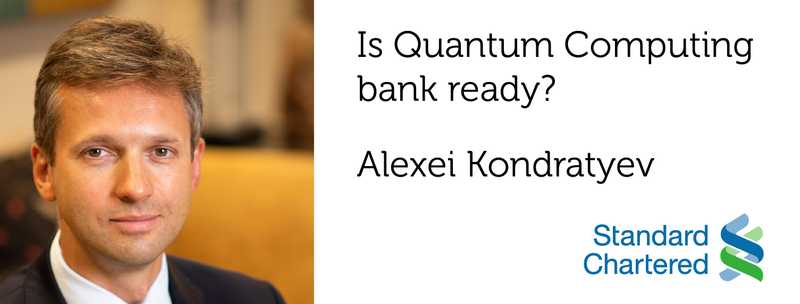Are Quantum Computers Bank Ready? - Interview with Alexei Kondratyev
May 21, 2020
Contributors: Alexei Kondratyev, Tim Grégory Graf
Some weeks ago, Alexei Kondratyev and I had a chat about his and his firm’s first steps into quantum computing. He is the managing director and the global head of data analytics at the Standard Chartered bank. Although he is a seasoned expert in finance, he has a strong scientific background, completing a Ph.D. on Quantum physics before finding his passion in the financial sector. On top of this, he is a strong advocate of the importance of natural science education in schools and high-schools. Cheers to that Alexei, I wish I had learned what was a photon before.
We discussed a set of questions that give some insights into the current readiness of quantum computing in finance. Happy reading, and see you on the other side.
In your 2018 paper ‘Reverse Quantum Annealing Approach to Portfolio Optimization Problems’, you mentioned that the portfolio allocation technique proposed on the paper could benefit from some improvements to shorten the Time to Solution (TTS). Have you made any follow-up research? Is the TTS with classical approaches still on par with the annealing-based TTS?
We haven’t made any follow-up work as of now. Most of the optimizations mentioned above rely on hardware adjustments. Therefore it wouldn’t make sense to do any further research until the new generation of hardware is available.
Have you considered offering financial products based on a purely Quantum-powered fund? Why yes/no? Who could invest in it?
Definitely not. The upcoming generation of D-Wave machines could only handle a portfolio of about 200 assets, which is not enough to obtain significant results. Current hardware is useful as a testing bed. However, it will take time until it’s ready to tackle industry-grade problems.
On another notice, the first applications will follow a hybrid computing protocol. This protocol consists in analyzing the parts that make the classical computing pipeline in finance and introducing Quantum processing only in those blocks that could benefit from a significant speedup.
The most promising applications as of today reside in supercharging the current machine learning toolset. Within this field, Quantum has already shown promising results in optimization and the generation of synthetic market data.
If you were to put together a team of 5 people to build a pilot for a financial Quantum Computing application, what would be the ideal constellation, in terms of backgrounds and skillsets?
All of them should have a Ph.D. level background in Physics. This requirement is not exceptional, as many of our current quants have similar experiences. The reason that makes this education a good foundation is that it provides excellent modeling and programming skills. Especially attractive are candidates with High-Performance Computing experience and hands-on Machine Learning and artificial intelligence skills.
Given how resource-intensive is Quantum research and that the explorative budget individual players can invest in Quantum is limited, could you imagine to create jointly with other financial institutions a Quantum Finance institute?
No, and it’s a matter of principles. Big financial institutions rarely engage in collaborations, as finance is a heavily regulated field. However, collaborations between banks and big technology companies are feasible, as we have already seen with the partnership between, e.g., IBM and several large financial institutions. Financial institutions are also open to collaborations with Fintech startups, by investment, acceleration, or even acquisition.
How many people you have at the moment working full time on Quantum at SC? Do you plan to grow your team anytime soon? If so, should the readers of this article know about any openings at SC?
At Standard Chartered, we are problem-driven and technology agnostic. Therefore, we are not planning to have a full Quantum team at any point. Quantum is just one tool out of many on our workbench. This doesn’t mean that we are not interested in applicants with a Quantum background, but their day to day activities won’t be restricted to Quantum computing.
As a personal note of the author, I want to close this article by thanking Alexei for his availability and for giving the London quantum Meetup a forum for discussion. London has a vibrant quantum computing ecosystem, that will improve its global positioning as quantum hardware becomes ready to meet the needs of its long-time consolidated financial sector.
Want to learn more about quantum? Why is it relevant to you, and why is it now the right time to jump into the field? We created Push Quantum, the organization that educates, connects, and empowers the quantum workforce. Join our next events, and learn the whys without the fuzz.
